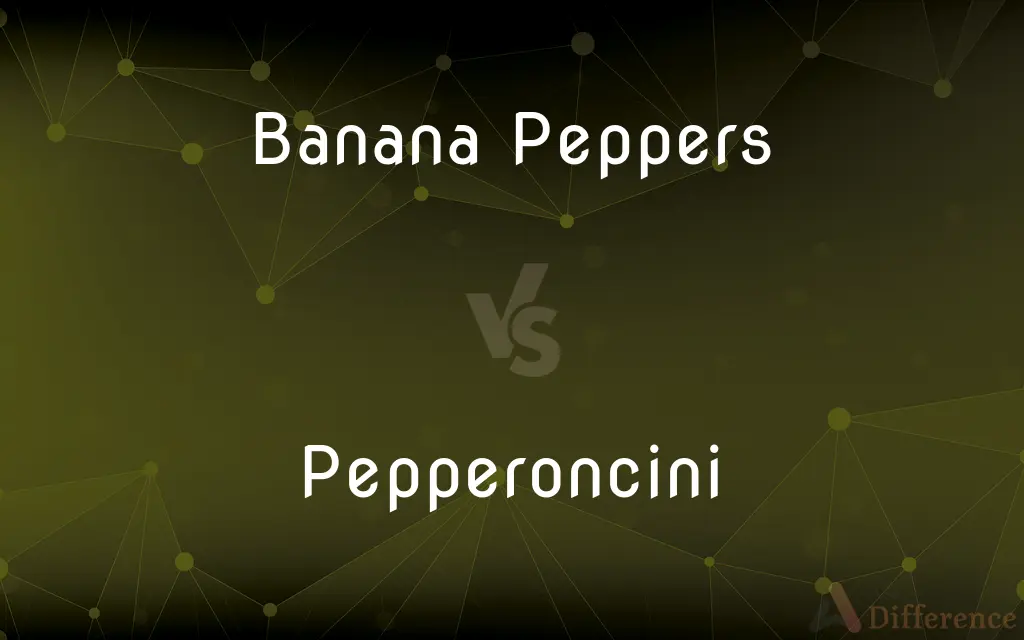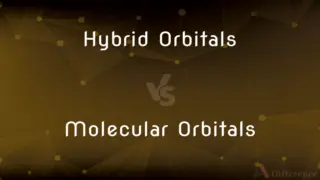Banana Peppers vs. Pepperoncini — What's the Difference?
By Tayyaba Rehman — Published on January 9, 2024
Banana peppers are mild, sweet, and often used in sandwiches and salads, while pepperoncini are slightly tangier and hotter, commonly found in Italian and Greek dishes.

Difference Between Banana Peppers and Pepperoncini
Table of Contents
ADVERTISEMENT
Key Differences
Banana peppers, also known as yellow wax peppers, are a mild variety of chili pepper named for their long, curved shape and yellow color that resembles a banana. They are characterized by their sweet, tangy flavor and are often used raw in salads, sandwiches, and as a garnish. Pepperoncini, also known as Tuscan peppers, are a variety of mild, slightly hot chili pepper that is a staple in Italian and Greek cuisines. They are smaller than banana peppers and are usually picked when green.
In terms of heat level, banana peppers are on the milder side, typically ranking 0-500 on the Scoville heat scale. They have a subtle sweetness and are less pungent. Pepperoncini are slightly hotter, usually ranking 100-500 on the Scoville scale, and have a more robust, somewhat tangy flavor. This slight difference in heat and flavor profile affects their culinary uses.
Banana peppers are commonly used fresh in culinary applications. They are excellent for adding a sweet, mild heat to dishes without overpowering other flavors. They are popular in American cuisine, especially on pizzas, in sandwiches, and salads. Pepperoncini are often pickled and used in Mediterranean dishes. They are a common accompaniment to Greek salads, pizzas, and sandwiches, providing a tangy, slightly spicy flavor.
In terms of appearance, banana peppers are typically bright yellow to pale green, long, and curved, whereas pepperoncini are usually smaller, wrinkled, and vary in color from green to red as they ripen. Both can be eaten raw, cooked, or pickled, but pepperoncini are more commonly found in pickled form.
Nutritionally, both banana peppers and pepperoncini are low in calories and contain vitamins A and C, but the difference in their flavor profile and heat level makes them suitable for different culinary uses. Banana peppers are preferred for a sweeter, milder taste, while pepperoncini are chosen for dishes requiring a tangy, slightly spicy kick.
ADVERTISEMENT
Comparison Chart
Flavor
Mild and sweet
Tangy and slightly hotter
Scoville Heat Units
0-500
100-500
Culinary Uses
Salads, sandwiches, garnishes
Pickled, in Mediterranean dishes
Appearance
Long, curved, yellow to green
Smaller, wrinkled, green to red
Common Form
Fresh
Often pickled
Compare with Definitions
Banana Peppers
Low Heat Level: Very mild on the Scoville scale.
Banana peppers are a great choice for those who prefer less spicy food.
Pepperoncini
Small and Wrinkled: Known for their wrinkled appearance.
The pepperoncini looked small and wrinkled but were packed with flavor.
Banana Peppers
Mild Chili Pepper: A sweet, mild variety of pepper.
She added sliced banana peppers to her salad for a mild kick.
Pepperoncini
Tangy Italian Pepper: A staple in Italian cuisine.
He garnished the pasta with sliced pepperoncini.
Banana Peppers
Salad Ingredient: Commonly used in salads.
Fresh banana peppers are a crunchy addition to garden salads.
Pepperoncini
Slightly Hot Flavor: Offers a bit of heat.
Pepperoncini add a tangy heat to Greek salads.
Banana Peppers
Yellow Wax Pepper: Known for its yellow color.
The sandwich was topped with bright yellow banana peppers.
Pepperoncini
Pickled in Mediterranean Dishes: Often used pickled.
The antipasto platter featured pickled pepperoncini.
Banana Peppers
Sweet Flavor: Characterized by a sweet taste.
Banana peppers bring a subtle sweetness to the pizza.
Pepperoncini
Mildly Spicy: Slightly spicier than banana peppers.
Pepperoncini provide a mild spice perfect for enhancing flavors.
Pepperoncini
Plural of pepperoncino
Common Curiosities
Do banana peppers get hotter as they ripen?
No, they maintain a mild flavor throughout their ripening.
Is pickling the only way to use pepperoncini?
No, they can also be used fresh, but pickling is the most common method.
Can you eat pepperoncini raw?
Yes, they can be eaten raw, but they are more commonly pickled.
Are banana peppers good for health?
Yes, they are low in calories and contain vitamins A and C.
How long can pickled banana peppers last?
When properly stored, they can last several months.
Can banana peppers cause allergies?
It's uncommon, but individuals with specific food allergies should be cautious.
Are pepperoncini seeds spicy?
The seeds can add a bit more heat but are not overly spicy.
Are banana peppers and pepperoncini high in sodium?
The pickled varieties can be high in sodium.
What dishes are best suited for pepperoncini?
They are great in Greek salads, sandwiches, pizzas, and as a part of antipasto platters.
Are banana peppers and pepperoncini interchangeable in recipes?
They can be, but expect a slight difference in flavor and heat.
Do pepperoncini need to be refrigerated after opening?
Yes, once opened, pickled pepperoncini should be refrigerated.
Can pepperoncini be used in hot dishes?
Yes, they can be cooked in hot dishes and add a tangy flavor.
Are banana peppers or pepperoncini better for pizza?
Both can be used, depending on your preference for sweetness (banana peppers) or tanginess (pepperoncini).
Can pepperoncini be used in meat marinades?
Yes, their tangy flavor makes them suitable for meat marinades.
Can you substitute pepperoncini with banana peppers in a Greek salad?
Yes, but the salad will have a sweeter tone instead of the usual tangy flavor of pepperoncini.
Are there any health benefits unique to pepperoncini?
They contain antioxidants, vitamins, and have anti-inflammatory properties.
Are there different varieties of banana peppers and pepperoncini?
Yes, both come in different varieties, offering slight variations in flavor and heat.
Can banana peppers be grown at home?
Yes, they are relatively easy to grow in gardens or containers.
Are pepperoncini peppers good for weight loss?
They can be part of a healthy diet due to their low calorie content and can contribute to a balanced weight loss plan.
Can banana peppers be used in cooking?
Yes, they can be cooked, though they are often used fresh due to their mild flavor.
Is it easy to find pepperoncini in grocery stores?
Yes, they are commonly available in the pickled foods section of most grocery stores.
What is the best way to store fresh banana peppers?
Store them in the refrigerator in a plastic bag for up to a week.
Are banana peppers or pepperoncini better for sandwiches?
It depends on personal preference; banana peppers add sweetness, while pepperoncini add tangy heat.
Is there a difference in shelf life between banana peppers and pepperoncini?
Fresh peppers have a similar shelf life, but pickled pepperoncini can last longer due to the preservation process.
Are banana peppers spicy like jalapeños?
No, banana peppers are much milder compared to jalapeños.
Is there a nutritional difference between banana peppers and pepperoncini?
Both are similar nutritionally, being low in calories and containing essential vitamins, but the preparation method can affect their nutritional value, especially sodium content in pickled varieties.
Can banana peppers be used in pickling?
Yes, banana peppers are also great for pickling.
Do pepperoncini become less spicy when pickled?
Pickling can slightly mellow their heat, but they retain a tangy flavor.
Can I grow pepperoncini in a home garden?
Yes, they can be grown in home gardens, similar to other chili peppers.
Are banana peppers or pepperoncini better for hot sauces?
Banana peppers are typically too mild for hot sauces; pepperoncini could be used for a milder, tangy sauce.
Share Your Discovery

Previous Comparison
Process in Java vs. Thread in Java
Next Comparison
Hybrid Orbitals vs. Molecular OrbitalsAuthor Spotlight
Written by
Tayyaba RehmanTayyaba Rehman is a distinguished writer, currently serving as a primary contributor to askdifference.com. As a researcher in semantics and etymology, Tayyaba's passion for the complexity of languages and their distinctions has found a perfect home on the platform. Tayyaba delves into the intricacies of language, distinguishing between commonly confused words and phrases, thereby providing clarity for readers worldwide.














































